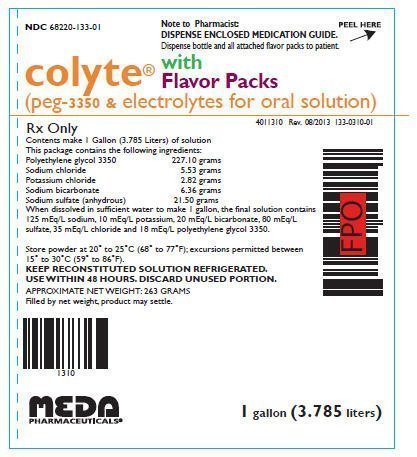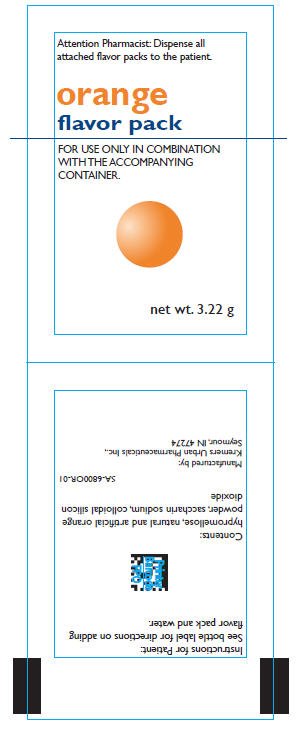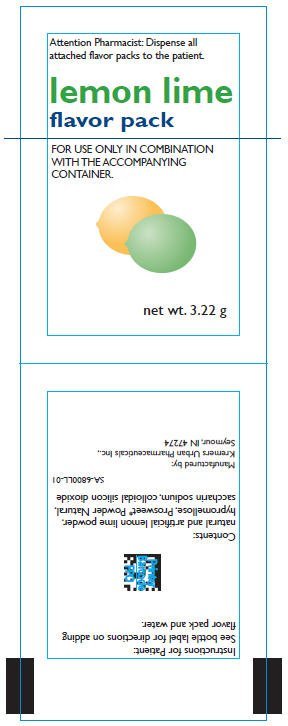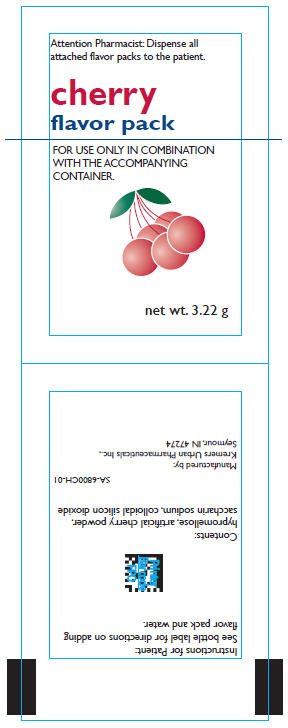Colyte: Package Insert / Prescribing Info
Package insert / product label
Generic name: polyethylene glycol 3350, sodium chloride, potassium chloride, sodium bicarbonate, and sodium sulfate anhydrous
Dosage form: powder, for solution
Drug class: Laxatives
Medically reviewed by Drugs.com. Last updated on Mar 25, 2024.
On This Page
DESCRIPTION: Colyte® with flavor packs is a colon lavage preparation provided as water-soluble components for solution. In solution this preparation with one flavor pack delivers the following, in grams per liter.
| Polyethylene glycol 3350 | 60.00 |
| Sodium chloride | 1.46 |
| Potassium chloride | 0.745 |
| Sodium bicarbonate | 1.68 |
| Sodium sulfate | 5.68 |
| Flavor ingredients | 0.851 |
When dissolved in sufficient water to make 1 gallon, the final solution contains 125 mEq/L sodium, 10 mEq/L potassium, 20 mEq/L bicarbonate, 80 mEq/L sulfate, 35 mEq/L chloride and 18 mEq/L polyethylene glycol 3350. The reconstituted solution is isosmotic and has a mildly salty taste. This preparation can be used without the flavor packs and is administered orally or via nasogastric tube.
Each orange flavor pack (3.22 g) contains hypromellose, natural and artifical orange powder, saccharin sodium, colloidal silicon dioxide. Each lemon lime flavor pack (3.22 g) contains, hypromellose, natural and artifical lemon lime powder, Prosweet® Powder Natural, saccharin sodium, colloidal silicon dioxide. Each cherry flavor pack (3.22 g) contains hypromellose, artifical cherry powder, saccharin sodium, colloidal silicon dioxide.
Colyte - Clinical Pharmacology
CLINICAL PHARMACOLOGY: Colyte® with flavor packs cleanses the bowel by induction of diarrhea. The osmotic activity of polyethylene glycol 3350, in combination with the electrolyte concentration, results in virtually no net absorption or excretion of ions or water.
INDICATIONS AND USAGE: Colyte with flavor packs is indicated for bowel cleansing prior to colonoscopy or barium enema X-ray examination.
Contraindications
Colyte is contraindicated in the following conditions:
- Gastrointestinal (GI) obstruction
- Bowel perforation
- Gastric retention
- Ileus
- Toxic colitis or toxic megacolon
- Known allergy or hypersensitivity to any component of Colyte [See How Supplied]
WARNINGS: Flavor packs are for use only in combination with the contents of the accompanying 1 gallon container. No other additional ingredients (e.g., flavorings) should be added to the solution. Colyte with flavor packs should be used with caution in patients with severe ulcerative colitis.
Precautions
General: Patients with impaired gag reflex, unconscious or semiconscious patients and patients prone to regurgitation or aspiration should be observed during the administration of Colyte® with flavor packs, especially if it is administered via nasogastric tube.
Serious Fluid and Serum Chemistry Abnormalities
Advise patients to hydrate adequately before, during, and after the use of Colyte. Use caution in patients with congestive heart failure when replacing fluids. If a patient develops significant vomiting or signs of dehydration including signs of orthostatic hypotension after taking Colyte, consider performing post-colonoscopy lab tests (electrolytes, creatinine, and BUN) and treat accordingly. Fluid and electrolyte disturbances can lead to serious adverse events including cardiac arrhythmias, seizures and renal impairment. Fluid and electrolyte abnormalities should be corrected before treatment with Colyte.
In addition, use caution when prescribing Colyte for patients who have conditions, or who are using medications, that increase the risk for fluid and electrolyte disturbances or may increase the risk of adverse events of seizure, arrhythmia, and renal impairment.
Cardiac Arrhythmias
There have been rare reports of serious arrhythmias associated with the use of ionic osmotic laxative products for bowel preparation. Use caution when prescribing Colyte for patients at increased risk of arrhythmias (e.g., patients with a history of prolonged QT, uncontrolled arrhythmias, recent myocardial infarction, unstable angina, congestive heart failure, or cardiomyopathy). Pre-dose and post-colonoscopy ECGs should be considered in patients at increased risk of serious cardiac arrhythmias.
Seizures
There have been reports of generalized tonic-clonic seizures and/or loss of consciousness associated with use of bowel preparation products in patients with no prior history of seizures. The seizures cases were associated with electrolyte abnormalities (e.g., hyponatremia, hypokalemia, hypocalcemia, and hypomagnesemia) and low serum osmolality. The neurologic abnormalities resolved with correction of fluid and electrolyte abnormalities.
Use caution with prescribing Colyte for patients with a history of seizures and in patients at increased risk of seizure, such as patients taking medications that lower the seizure threshold (e.g., tricyclic antidepressants), patients withdrawing from alcohol or benzodiazepines, or patients with known or suspected hyponatremia.
Renal Impairment
Use caution when prescribing Colyte for patients with impaired renal function or patients taking concomitant medications that may affect renal function (such as diuretics, angiotensin converting enzyme inhibitors, angiotensin receptor blockers, or non-steroidal anti-inflammatory drugs). Advise these patients of the importance of adequate hydration, and consider performing baseline and post-colonoscopy laboratory tests (electrolytes, creatinine, and BUN) in these patients.
Colonic Mucosal Ulcerations and Ischemic Colitis
Administration of osmotic laxative products may produce colonic mucosal aphthous ulcerations, and there have been reports of more serious cases of ischemic colitis requiring hospitalization. Concurrent use of stimulant laxatives and Colyte may increase the risk. The potential for mucosal ulcerations resulting from the bowel preparation should be considered when interpreting colonoscopy findings in patients with known or suspected inflammatory bowel disease (IBD).
Use in Patients with Significant Gastrointestinal Disease
If gastrointestinal obstruction or perforation is suspected, perform appropriate diagnostic studies to rule out these conditions before administering Colyte. Use caution in patients with severe active ulcerative colitis.
Aspiration
Use with caution in patients with impaired gag reflex and patients prone to regurgitation or aspiration. Such patients should be observed during administration of Colyte, especially if it is administered via nasogastric tube.
Not for Direct Ingestion
The contents of each jug must be diluted with water to final volume of 4 liters (4L) and ingestion of additional water is important to patient tolerance. Direct ingestion of the undissolved powder may increase the risk of nausea, vomiting, dehydration, and electrolyte disturbances.
If gastrointestinal obstruction or perforation is suspected appropriate studies should be performed to rule out these conditions before administration of colyte® with flavor packs.
Patient Counseling Information: (see Medication Guide)
Colyte® with flavor packs produces a watery stool which cleanses the bowel prior to examination.
For best results, no solid food should be ingested during the 3 - 4 hour period prior to the initiation of Colyte with flavor packs administration. In no case should solid foods be eaten within 2 hours of drinking Colyte with flavor packs.
The rate of administration is 240 mL (8 fl. oz.) every 10 minutes. Rapid drinking of each portion is preferred rather than drinking small amounts continuously.
The first bowel movement should occur approximately one hour after the start of Colyte with flavor packs administration.
Administration of Colyte with flavor packs should be continued until the watery stool is clear and free of solid matter. This normally requires the consumption of approximately 3-4 liters (3-4 quarts), although more or less may be required in some patients. The unused portion should be discarded.
Consume water or clear liquids during the bowel preparation and after completion of the bowel preparation up until 2 hours before the time of the colonoscopy.
Drug Interactions:
Drugs That May Increase Risks Due to Fluid and Electrolyte Abnormalities
Use caution when prescribing Colyte for patients with conditions, or who are using medications, that increase the risk for fluid and electrolyte disturbances or may increase the risk of adverse events of seizures, arrhythmias, and prolonged QT in the setting of fluid and electrolyte abnormalities. Consider additional patient evaluations as appropriate (see Precautions) in patients taking these concomitant medications.
Potential for Altered Drug Absorption
Oral medication administered within one hour of the start of administration of Colyte may be flushed from the gastrointestinal tract and the medication may not be absorbed properly.
Carcinogenesis, Mutagenesis, Impairment of Fertility: Studies to evaluate carcinogenesis or mutagenic potential or potential to adversely affect male or female fertility have not been performed.
Pregnancy: Category C. Animal reproduction studies have not been conducted with Colyte to evaluate the carcinogenic potential. It is not known whether Colyte can cause fetal harm when administered to a pregnant woman or can affect reproductive capacity. Colyte should be given to a pregnant woman only if clearly needed.
Pediatric Use: The safety and effectiveness of Colyte in pediatric patients have not been established.
Geriatric Use: Published literature contains isolated reports of serious adverse reactions following the administration of PEG-ELS products in patients over 60 years of age. These adverse events include upper GI bleeding from Mallory-Weiss Tear, esophageal perforation, asystole, sudden dyspnea with pulmonary edema, and "butterfly-like" infiltrate on chest x-ray after vomiting and aspirating PEG.
Adverse Reactions/Side Effects
ADVERSE REACTIONS: Because clinical studies are conducted under widely varying conditions, adverse reaction rates observed in the clinical studies of a drug cannot be directly compared to rates in clinical studies of another drug and may not reflect the rates observed in practice.
Nausea, abdominal fullness and bloating are the most common adverse reactions (occurring in up to 50% of patients) to administration of Colyte. Abdominal cramps, vomiting and anal irritation occur less frequently. These adverse reactions are transient and usually subside rapidly. Isolated cases of urticaria, rhinorrhea, dermatitis, and rarely anaphylaxis, angioedema, tongue edema, and face edema have been reported which may represent allergic reactions.
To report suspected adverse events contact Meda Pharmaceuticals Inc. at toll free 1-888-317-0001 or FDA at 1-800-FDA-1088 or www.fda.gov/medwatch.
DOSAGE AND ADMINISTRATION: Colyte with flavor packs can be administered orally or by nasogastric tube. Patients should fast at least 3 hours prior to administration. A one hour waiting period after the appearance of clear liquid stool should be allowed prior to examination to complete bowel evacuation. No foods except clear liquids should be permitted prior to examination after Colyte with flavor packs administration.
Oral: The recommended adult oral dose is 240 mL (8 fl. oz.) every 10 minutes (see PRECAUTIONS, Information for Patients). Lavage is complete when fecal discharge is clear. Lavage is usually complete after the ingestion of 3-4 liters (3-4 quarts).
Nasogastric Tube: Colyte with flavor packs is administered at a rate of 20-30 mL per minute (1.2-1.8 L/hour).
Preparation of Colyte with flavor packs Solution:
This preparation can be used with or without flavor packs.
- To add flavor, tear open one flavor pack at the indicated marking and pour contents into the bottle BEFORE reconstitution. Discard unused flavor packs.
- SHAKE WELL to incorporate flavoring into powder.
- Add tap water to FILL line. Replace cap tightly and mix or shake well until all ingredients have dissolved. (No other additional ingredients, e.g. flavorings, should be added to the solution.)
Note: If not using flavor packs, omit steps one and two above.
HOW SUPPLIED: Colyte with flavor packs is supplied in 1 gallon bottles with an attached package containing flavor packs. Each 1 gallon bottle contains polyethylene glycol 3350 227.10 g, sodium chloride 5.53 g, potassium chloride 2.82 g, sodium bicarbonate 6.36 g, sodium sulfate (anhydrous) 21.50 g. Each preparation is supplied in powdered form, for oral administration as a solution.
Colyte with flavor packs 1 gallon NDC 68220-133-01
Rx only
Manufactured for:
Meda Pharmaceuticals Inc.
Somerset, NJ, USA
Manufactured by: Kremers Urban Pharmaceuticals Inc., Seymour, IN 47274
For Medical Inquiries,
Call toll-free 1-888-317-0001
NDC 68220-133-01
REV 08/ 2013
Medication Guide
Colyte® (co-light) with Flavor Packs
(peg-3350 & electrolytes for oral solution)
Read this Medication Guide before you start taking Colyte. This information does not take the place of talking to your healthcare provider about your medical condition or your treatment.
What is the most important information I should know about Colyte?
Colyte can cause serious side effect, including:
Serious loss of body fluid (dehydration) and changes in blood salts (electrolytes) in your blood. These changes can cause:
- abnormal heartbeats that can cause death
- seizures. This can happen even if you have never had a seizure.
- kidney problems
Your risk of having fluid loss and changes in body salts with Colyte is higher if you:
- have heart problems
- have kidney problems
- take water pills (diuretics) or non-steroidal anti-inflammatory drugs (NSAIDS)
Tell your healthcare provider right away if you have any of these symptoms of a loss of too much body fluid (dehydration) while taking Colyte:
- vomiting
- dizziness
- urinating less often than normal
- headache
See “What are the possible side effects of Colyte?” for more information about side effects.
What is Colyte?
Colyte is a prescription medicine used to clean the colon before a colonoscopy or barium enema X-ray examination. Colyte cleans your colon by causing you to have diarrhea. Cleaning your colon helps your healthcare provider see the inside of your colon more clearly during your colonoscopy or barium enema X-ray examination.
It is not known if Colyte is safe and effective in children.
Who should not take Colyte?
Do not take Colyte if your healthcare provider has told you that you have:
- a blockage in your intestine (bowel obstruction)
- an opening in the wall of your stomach or intestine (bowel perforation)
- problems with food and fluid emptying from your stomach (gastric retention)
- a very dilated intestine (toxic megacolon)
- an allergy to any of the ingredients in Colyte. See the end of this leaflet for a complete list of ingredients in Colyte.
What should I tell my healthcare provider before taking Colyte?
Before you take Colyte, tell your healthcare provider if you:
- have heart problems
- have a history of seizures
- have kidney problems
- have ulcerative colitis
- have stomach or bowel problems
- have problems with swallowing or gastric reflux
- are withdrawing from drinking alcohol
- have a low blood salt (sodium) level
- have any other medical conditions
- are pregnant or plan to become pregnant. It is not known if Colyte will harm your unborn baby.
- are breastfeeding or plan to breastfeed. It is not known if Colyte passes into your breast milk. You and your healthcare provider should decide if you will take Colyte while breastfeeding.
Tell your healthcare provider about all the medications you take, including prescription and over-the-counter medicines, vitamins, and herbal supplements.
Colyte may affect how other medicines work. Medicines taken by mouth may not be absorbed properly when taken within 1 hour before the start of Colyte.
Especially tell you healthcare provider if you take:
- medicines for blood pressure or heart problems
- medicines for kidney problems
- medicines for seizures
- water pills (diuretics)
- non-steroidal anti-inflammatory medicines (NSAID) pain medicines
- laxatives
Ask your healthcare provider or pharmacist for a list of these medicines if you are not sure if you are taking any of the medicines listed above
Know the medicines you take. Keep a list of them to show your healthcare provider and pharmacist when you get a new medicine.
How should I take Colyte?
See the Instructions for Use at the end of this Medication Guide for dosing instructions. You must read, understand, and follow these instructions to take Colyte the right way.
- Take Colyte exactly as your healthcare provider tells you to take it.
- The powder in the Colyte container must be mixed with water (diluted) before drinking. Do not take Colyte that has not been mixed with water, it may increase your risk of nausea, vomiting and fluid loss (dehydration).
- Do not eat any solid foods 3 hours before you start taking Colyte, while taking Colyte, and 2 hours after taking Colyte.
- Drink clear liquids before you start taking Colyte, while you take Colyte and after you finish taking Colyte to help prevent fluid loss (dehydration). Examples of clear liquids are:
- water
- clear fruit juices without pulp including apple, white grape, or white cranberry
- strained limeade or lemonade
- coffee or tea (Do not use any dairy or non-dairy creamer)
- clear broth
- clear soda
- gelatin (without added fruit or topping)
- popsicles without pieces of fruit or fruit pulp
Do not eat or drink anything colored red or purple.
- Do not eat or drink anything 2 hours before your colonoscopy or barium enema X-ray examination.
- You should have your first bowel movement about 1 hour after you start taking Colyte. Continue to take Colyte according to the Instructions for Use until your stool is clear, watery, and has no solid material in it.
- Do not take other laxatives while taking Colyte.
- Stop drinking Colyte solution temporarily or allow for longer time between each dose if you have stomach discomfort, pain or bloating until your symptoms improve. If symptoms continue, tell your healthcare provider.
What are the possible side effects of Colyte?
Colyte can cause serious side effects, including:
- See “What is the most important information I should know about Colyte?”
-
changes in certain blood tests. Your healthcare provider may do blood tests after you take Colyte to check your blood for changes. Tell your healthcare provider if you have any symptoms of too much fluid loss, including:
- vomiting
- nausea
- bloating
- dizziness
- stomach-area (abdomen) cramping
- headache
- urinate less than usual
- trouble drinking clear liquid
- ulcers of the bowel or bowel problems (ischemic colitis). Tell your healthcare provider right away if you have severe stomach-area (abdomen) pain or rectal bleeding.
The most common side effects of Colyte include:
- nausea
- stomach-area (abdomen) fullness and bloating
Tell your healthcare provider if you have any side effect that bothers you or does not go away.
These are not all the possible side effects of Colyte. For more information, ask you healthcare provider or pharmacist.
Call your doctor for medical advice about side effects. You may report side effects to FDA at 1-800-FDA-1088.
How should I store Colyte?
- Store Colyte at 68°F to 77°F (20°C to 25°C).
- Store Colyte that has been mixed with water in the refrigerator.
- Use Colyte within 48 hours after mixing with water. Safely throw away any Colyte that you do not use.
Keep Colyte and all medicines out of the reach of children.
General information about the safe and effective use of Colyte.
Medicines are sometimes prescribed for purposes other than those listed in a Medication Guide. Do not use Colyte for a condition for which it was not prescribed. Do not give Colyte to other people, even if they are going to have the same procedure you are. It may harm them.
This Medication Guide summarizes the most important information about Colyte. If you would like more information, talk with your healthcare provider. You can ask your pharmacist or healthcare provider for information about Colyte that is written for health professionals.
For more information about Colyte, call 1-888-317-0001.
What are the ingredients in Colyte?
Active ingredients: polyethylene glycol (PEG) 3350, sodium chloride, potassium chloride, sodium bicarbonate, sodium sulfate
Inactive ingredients: Flavor pack ingredients:
Orange flavor pack:hypromellose, natural and artificial orange powder, saccharin sodium, colloidal silicon dioxide
Lemon lime flavor pack: hypromellose, natural and artificial lemon lime powder, Prosweet® Powder Natural, saccharin sodium, colloidal silicon dioxide
Cherry flavor pack: hypromellose, artificial cherry powder, saccharin sodium, colloidal silicon dioxide
Issued: August/2013
Instructions for Use
Colyte®(co-light) with Flavor Packs
(peg-3350 & electrolytes for oral solution)
Read this Instructions for Use before you start taking Colyte. This information does not take the place of talking with your healthcare provider about your medical condition or your treatment.
How should I take Colyte?
Colyte can be taken with or without a flavor pack. If you use a flavor pack, complete Steps 1 through 8. If you do not use a flavor pack, throw away the flavor packs and complete Steps 4 through 8.
Step 1: Remove the cap from the Colyte bottle.
Step 2: Tear open 1 flavor pack of your choice and pour contents into the Colyte bottle. Throw away the unused flavor packs.
Step 3: Replace the cap on the Colyte bottle. Shake the Colyte bottle well to mix the contents of the flavor pack into the powder.
Step 4: Remove the cap from the Colyte bottle. Add water to the top of the line on the Colyte bottle marked “FILL TO TOP OF LINE ONE GALLON”.
Step 5: Replace the cap on the Colyte bottle tightly and shake the Colyte bottle well to dissolve the powder. No other ingredients should be added to the Colyte bottle.
Step 6: Refrigerate the Colyte solution until you are ready to drink it. The Colyte solution should be used within 48 hours after mixing.
Step 7: Drink one 8 ounce glass of Colyte solution every 10 minutes. It is best to drink each glass of Colyte solution quickly, instead of sipping it slowly. Continue drinking one 8 ounce glass of Colyte solution every 10 minutes until your stool is clear, watery, and has no solid material in it. This normally requires drinking 3 to 4 liters of Colyte solution to clean your colon. The Colyte bottle should be empty or have less than 1 liter of Colyte solution remaining when your colon cleaning is completed.
Step 8: Safely throw away any Colyte solution that you do not use.
This Medication Guide and Instructions for Use have been approved by the U.S. Food and Drug Administration.
Manufactured for:
Meda Pharmaceuticals Inc., Somerset, NJ, USA
Manufactured by: Kremers Urban Pharmaceuticals Inc., Seymour, In 47274, USA
For Medical Inquiries, Call toll-free 1-888-317-0001
Revised 08/2013
PRINCIPAL DISPLAY PANEL - Colyte Label
NDC 68220-133-01 Note to Pharmacist:
DISPENSE ENCLOSED MEDICATION GUIDE.
Dispense bottle and all attached flavor packs to patient.
colyte®
with
Flavor Packs
(peg-3350 & electrolytes for oral solution)
Rx Only
4011310 Rev. 08/2013 133-0310-01
Contents make 1 Gallon (3.785 Liters) of solution
This package contains the following ingredients:
| Polyethylene glycol 3350 | 227.10 grams |
| Sodium chloride | 5.53 grams |
| Potassium chloride | 2.82 grams |
| Sodium bicarbonate | 6.36 grams |
| Sodium sulfate (anhydrous) | 21.50 grams |
When dissolved in sufficient water to make 1 gallon, the final solution contains
125 mEq/L sodium, 10 mEq/L potassium, 20 mEq/L bicarbonate, 80 mEq/L
sulfate, 35 mEq/L chloride and 18 mEq/L polyethylene glycol 3350.
Store powder at 20° to 25°C (68° to 77°F); excursions permitted between
15° to 30°C (59° to 86°F).
KEEP RECONSTITUTED SOLUTION REFRIGERATED.
USE WITHIN 48 HOURS. DISCARD UNUSED PORTION.
APPROXIMATE NET WEIGHT: 263 GRAMS
Filled by net weight, product may settle.
MEDA
PHARMACEUTICALS®
1 gallon (3.785 liters)

PRINCIPAL DISPLAY PANEL - 3.22 g Orange Flavor Pack Label
Attention Pharmacist: Dispense all
attached flavor packs to the patient.
orange
flavor pack
FOR USE ONLY IN COMBINATION WITH
THE ACCOMPANYING CONTAINER.
net wt. 3.22 g

| COLYTE
polyethylene glycol 3350, sodium chloride, potassium chloride, sodium bicarbonate, and sodium sulfate anhydrous powder, for solution |
|||||||||||||||||||||
|
|||||||||||||||||||||
|
|||||||||||||||||||||
|
|||||||||||||||||||||
|
|||||||||||||||||||||
|
|||||||||||||||||||||
| Labeler - Alaven Pharmaceutical LLC (140210829) |
| Registrant - Meda Pharmaceuticals Inc. (051229602) |
More about Colyte (polyethylene glycol 3350 with electrolytes)
- Check interactions
- Compare alternatives
- Reviews (5)
- Side effects
- Dosage information
- During pregnancy
- Drug class: laxatives
Patient resources
Professional resources
Other brands
GoLYTELY, GaviLyte-G, Plenvu, GaviLyte-C, ... +5 more


